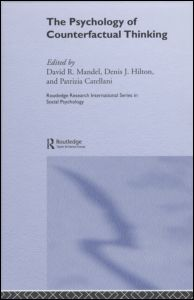The course of events: counterfactuals, causal sequences, and explanation
Hilton, Denis J., McClure, John J., and Slugoski, Ben R. (2005) The course of events: counterfactuals, causal sequences, and explanation. In: Mandel, David R., Hilton, Denis J., and Catellani, Patrizia, (eds.) The Psychology of Counterfactual Thinking. Routledge Research International Series in Social Psychology . Routledge, Abingdon, Oxon, UK, pp. 44-60.
|
PDF (Published Version)
- Published Version
Restricted to Repository staff only |
||
![[img]](https://researchonline.jcu.edu.au/7484/2.hassmallThumbnailVersion/7484_Hilton_et_al_2005.jpg)
|
Image (JPEG) (Front Cover)
- Cover Image
Download (8kB) |
Abstract
[Extract] Causal explanations can help us understand why events change course, and why the world turned out differently to what we might have expected. Even in understanding simple narratives of events, people form mental representations that incorporate causal inferences (e.g., Graesser et al. 1981; Hilton 1985; Read 1987; Schank and Abelson 1977; Trabasso and Sperry 1985; Trabasso and van den Broek 1985; Wilensky 1983). In addition, research on counterfactual reasoning has also used simple narratives to explore which factors are likely to be mutated (e.g., Byrne et al. 2000; Wells et al. 1987), and has demonstrated the complexity of the mental representations of these narratives through showing, among other things, that people do not always mutate causes when responding to counterfactual "if only" probes (Mandel and Lehman 1996; N'gbala and Branscombe 1995). Finally, in their analysis of close counterfactuals, Kahneman and Varey (1990) argue that people not only represent what happened, but also what almost happened.
| Item ID: | 7484 |
|---|---|
| Item Type: | Book Chapter (Research - B1) |
| ISBN: | 978-0-415-32241-6 |
| Date Deposited: | 16 Feb 2010 22:57 |
| FoR Codes: | 17 PSYCHOLOGY AND COGNITIVE SCIENCES > 1701 Psychology > 170113 Social and Community Psychology @ 100% |
| SEO Codes: | 97 EXPANDING KNOWLEDGE > 970117 Expanding Knowledge in Psychology and Cognitive Sciences @ 100% |
| Downloads: |
Total: 224 Last 12 Months: 5 |
| More Statistics |



